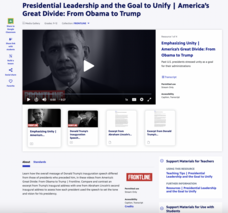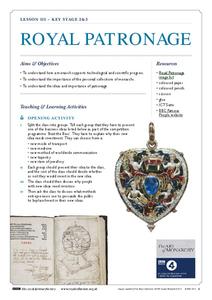PBS
George Washington Carver: Scientist, Inventor, and Teacher
Using video clips along with primary and secondary documents, scholars analyze the life of George Washington Carver, one of America's best scientists and inventors. Class members then create music, posters, and skits about this amazing...
US Institute of Peace
Perspectives on Peace
Is peace simply the absence of war, or is there more to the story? Young social scientists define peace in the second installment of a 15-part series. Groups work together to explore cultural concepts of peace and the peacemaking process...
US Institute of Peace
Maintaining Trusting Relationships
What role does trust play in diffusing a tense situation? Young social scientists explore trust on a personal and global level during a lesson on peace and conflict. After participating in a trust sit, participants work in groups to...
The New York Times
Where to Draw the Line: Balancing Government Surveillance with the Fourth Amendment
The question of how to balance Fourth Amendment Rights with national security concerns becomes critical in an age of planned terrorist attacks, election interference, and fake news. Get young social scientists involved in the debate with...
Learning for Justice
The Color of Law: Creating Racially Segregated Communities
It is pointed, powerful, and painful! The first of three lessons about laws and practices that support inequality looks at how government policies created and reinforced segregated communities. Young social scientists read excerpts from...
Anti-Defamation League
What are Reparations and Should We Enact Them?
Young social scientists investigate recent legislative proposals for reparations for African Americans. They examine the rationale behind the proposals by viewing videos and reading related articles. To close the instructional activity,...
Greater Good Science Center
See The Good Challenge
Scientists study all sorts of things. For example, studies show that it feels good to feel grateful. Feeling grateful also contributes to physical health and strengthen relationships. In the second lesson about gratitude, class members...
Museum of the American Revolution
Leadership and Alexander Hamilton
Alexander Hamilton serves as a model in a instructional activity that asks young political scientists to consider the strengths and weaknesses of six different leadership styles. They read a brief overview of Hamilton's activities...
PBS
Presidential Leadership and the Goal to Unify | America’s Great Divide: From Obama to Trump
Traditionally, a United States President's Inaugural Address establishes the tone and vision for his presidency. It has stressed the goal to unify the country and bring the political parties together after what are often divisive...
PBS
Alexander Graham Bell: Scientist, Inventor, and Teacher
Hello? Hello? Scholars investigate the impact Alexander Graham Bell's telephone had on the American landscape. Using drawings, video clips, and primary sources, the mind of the inventor comes to light as pupils dream of new inventions to...
BBC
Royal Patronage
The relationship between European royalty and the artists, scientists, and philosophers they support has been a building block in the artistic and technological progress throughout the world. Learn more about patronage throughout the...
National Woman's History Museum
Stacey Abrams: Changing the Trajectory of Protecting People’s Voices and Votes
In this project-based learning lesson, young social scientists investigate Stacey Abrams' campaign to protect the voting rights of people across the nation. Investigators learn how to annotate assigned articles, watch videos, and collect...
Montana State University
What's the Weather?
How many jackets do you need to stay warm and climb Mount Everest? An informatie resource covers the topic of Mount Everest, the resource helps young scientists discover the difference between climate and weather. Activities include...
Curated OER
Tech: Medical Forensics
High schoolers explore what it takes to be a forensic scientist or pathologist. They view a PowerPoint, discuss what education and skills are needed to succeed as a pathologist. They play a game to test their observation skills, a skill...
Channel Islands Film
Arlington Springs Man: Lesson Plan 3
Imagine being part of a team of scientists that discover the oldest human remains in North America. Imagine being part of the crew that documents this discovery. Class members get a change to be part of such an exciting adventure in a...
National Park Service
The Young Naturalist
Beginning with a brief history of our 26th president, Theodore Roosevelt, then followed by a discussion of his interest in nature, young scientists take to the outdoors to locate and observe local plants and insects. Scholars return to...
C3 Teachers
Black Genius: How Did Black Genius Help Build American Democracy?
"How did the slavery system undermine the United States' democratic principles?" This question launches a study of how the Preamble to the Declaration of Independence, Article I, Section 2 of the U.S. Constitution, and Article IV,...
Anti-Defamation League
Representing the People: Diversity and Elections
After studying statistics and reading articles about diversity in the 2018 through 2020 U.S. elections, young social scientists discuss what they believe is the impact of having more diverse elected officials. Individuals then select one...
Channel Islands Film
Human Impact on the Food Web of Santa Cruz Island
What happens when a non-native species is introduced onto an island? Santa Cruz Island, part of the Channel Island chain located off the coast of southern California, provides the perfect laboratory for young environmental scientists to...
Channel Islands Film
Island Rotation: Lesson Plan 1
How do scientists provide evidence to support the theories they put forth? What clues do they put together to create these theories? After watching West of the West's documentary Island Rotation class members engage in a series of...
DocsTeach
Benjamin Franklin: Politician and Diplomat
Benjamin Franklin was many things: a scientist, businessman, diplomat, politician. Learners explore facets of the legendary figure with a matching activity. By matching primary source documents to their descriptions, they analyze the...
Encyclopedia Britannica
Beyond a Two-Party System
Young political scientists go beyond the two-party system and research third-party candidates running in the 2020 US Presidential election. Groups present background information about the candidate, the party's platform points, and a...
Encyclopedia Britannica
Meta-Study: Political Brains
Are there differences in the brains of liberals and conservatives? That is the question young political scientists are challenged to answer. Class members examine studies, consider how the results are presented, and how the studies were...
Facing History and Ourselves
Defining Democracy
For democracies, it is both the best and the worst of times. As part of a study of the challenges facing democracies, young political scientists seek first to define democracy, and then to consider the relationship between democracy and...

























